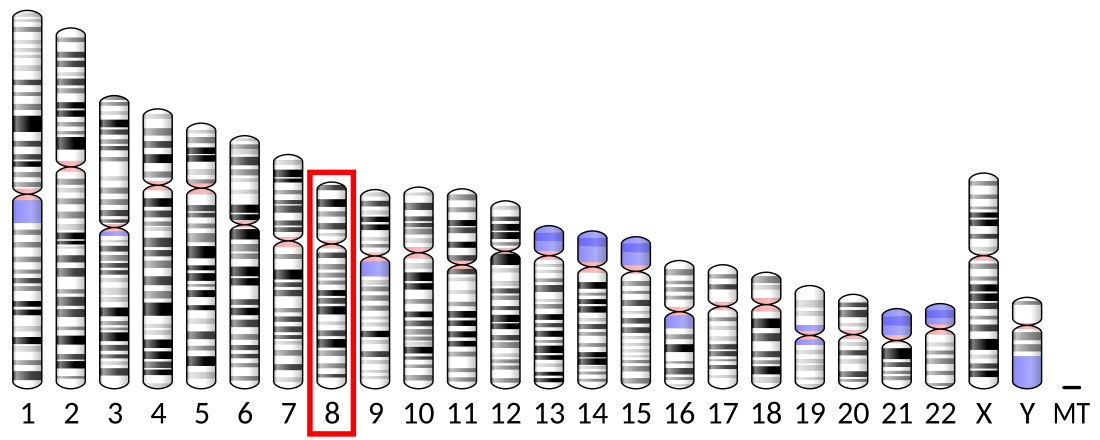60S ribosomal protein L7 is a protein that in humans is encoded by the RPL7 gene.[5][6][7]
Quick Facts RPL7, Available structures ...
Close
Ribosomes, the organelles that catalyze protein synthesis, consist of a small 40S subunit and a large 60S subunit. Together these subunits are composed of 4 RNA species and approximately 80 structurally distinct proteins. This gene encodes a ribosomal protein that is a component of the 60S subunit. The protein belongs to the L30P family of ribosomal proteins. It contains an N-terminal basic region-leucine zipper (BZIP)-like domain and the RNP consensus sub-motif RNP2. In vitro the BZIP-like domain mediates homodimerization and stable binding to DNA and RNA, with a preference for 28S rRNA and mRNA. The protein can inhibit cell-free translation of mRNAs, suggesting that it plays a regulatory role in the translation apparatus. It is located in the cytoplasm. The protein has been shown to be an autoantigen in patients with systemic autoimmune diseases, such as systemic lupus erythematosus. As is typical for genes encoding ribosomal proteins, there are multiple processed pseudogenes of this gene dispersed through the genome.[7]
RPL7 has been shown to interact with ZNF7.[8] It interacts with HIV-1 Gag protein through Zinc Finger of HIV-1 Gag.[9]
- Wool IG, Chan YL, Glück A (1996). "Structure and evolution of mammalian ribosomal proteins". Biochemistry and Cell Biology. 73 (11–12): 933–47. doi:10.1139/o95-101. PMID 8722009.
- von Mikecz A, Hemmerich P, Peter HH, Krawinkel U (December 1994). "Characterization of eukaryotic protein L7 as a novel autoantigen which frequently elicits an immune response in patients suffering from systemic autoimmune disease". Immunobiology. 192 (1–2): 137–54. doi:10.1016/S0171-2985(11)80413-4. PMID 7750987.
- Neumann F, Hemmerich P, von Mikecz A, Peter HH, Krawinkel U (January 1995). "Human ribosomal protein L7 inhibits cell-free translation in reticulocyte lysates and affects the expression of nuclear proteins upon stable transfection into Jurkat T-lymphoma cells". Nucleic Acids Research. 23 (2): 195–202. doi:10.1093/nar/23.2.195. PMC 306654. PMID 7862521.
- Maruyama K, Sugano S (January 1994). "Oligo-capping: a simple method to replace the cap structure of eukaryotic mRNAs with oligoribonucleotides". Gene. 138 (1–2): 171–4. doi:10.1016/0378-1119(94)90802-8. PMID 8125298.
- Witte S, Krawinkel U (August 1997). "Specific interactions of the autoantigen L7 with multi-zinc finger protein ZNF7 and ribosomal protein S7". The Journal of Biological Chemistry. 272 (35): 22243–7. doi:10.1074/jbc.272.35.22243. PMID 9268371.
- Suzuki Y, Yoshitomo-Nakagawa K, Maruyama K, Suyama A, Sugano S (October 1997). "Construction and characterization of a full length-enriched and a 5'-end-enriched cDNA library". Gene. 200 (1–2): 149–56. doi:10.1016/S0378-1119(97)00411-3. PMID 9373149.
- Kenmochi N, Kawaguchi T, Rozen S, Davis E, Goodman N, Hudson TJ, Tanaka T, Page DC (May 1998). "A map of 75 human ribosomal protein genes". Genome Research. 8 (5): 509–23. doi:10.1101/gr.8.5.509. PMID 9582194.
- Andersen JS, Lyon CE, Fox AH, Leung AK, Lam YW, Steen H, Mann M, Lamond AI (January 2002). "Directed proteomic analysis of the human nucleolus". Current Biology. 12 (1): 1–11. Bibcode:2002CBio...12....1A. doi:10.1016/S0960-9822(01)00650-9. PMID 11790298. S2CID 14132033.
- Brezillon S, Lannoy V, Franssen JD, Le Poul E, Dupriez V, Lucchetti J, Detheux M, Parmentier M (January 2003). "Identification of natural ligands for the orphan G protein-coupled receptors GPR7 and GPR8". The Journal of Biological Chemistry. 278 (2): 776–83. doi:10.1074/jbc.M206396200. PMID 12401809.
- Kasai H, Nadano D, Hidaka E, Higuchi K, Kawakubo M, Sato TA, Nakayama J (May 2003). "Differential expression of ribosomal proteins in human normal and neoplastic colorectum". The Journal of Histochemistry and Cytochemistry. 51 (5): 567–74. doi:10.1177/002215540305100502. PMID 12704204. S2CID 25865715.
- Odintsova TI, Müller EC, Ivanov AV, Egorov TA, Bienert R, Vladimirov SN, Kostka S, Otto A, Wittmann-Liebold B, Karpova GG (April 2003). "Characterization and analysis of posttranslational modifications of the human large cytoplasmic ribosomal subunit proteins by mass spectrometry and Edman sequencing". Journal of Protein Chemistry. 22 (3): 249–58. doi:10.1023/A:1025068419698. PMID 12962325. S2CID 10710245.
- Rush J, Moritz A, Lee KA, Guo A, Goss VL, Spek EJ, Zhang H, Zha XM, Polakiewicz RD, Comb MJ (January 2005). "Immunoaffinity profiling of tyrosine phosphorylation in cancer cells". Nature Biotechnology. 23 (1): 94–101. doi:10.1038/nbt1046. PMID 15592455. S2CID 7200157.
- Andersen JS, Lam YW, Leung AK, Ong SE, Lyon CE, Lamond AI, Mann M (January 2005). "Nucleolar proteome dynamics". Nature. 433 (7021): 77–83. Bibcode:2005Natur.433...77A. doi:10.1038/nature03207. PMID 15635413. S2CID 4344740.
- Ko JR, Wu JY, Kirby R, Li IF, Lin A (July 2006). "Mapping the essential structures of human ribosomal protein L7 for nuclear entry, ribosome assembly and function". FEBS Letters. 580 (16): 3804–10. doi:10.1016/j.febslet.2006.05.073. PMID 16797011. S2CID 25168455.
- Wu WC, Liu HW, Lin A (February 2007). "Human ribosomal protein L7 displays an ER binding property and is involved in ribosome-ER association". FEBS Letters. 581 (4): 651–7. doi:10.1016/j.febslet.2007.01.023. PMID 17258209. S2CID 30461645.






